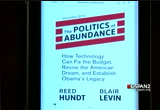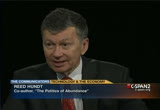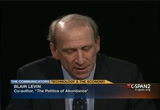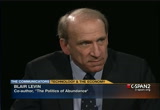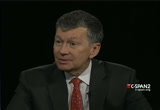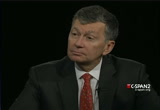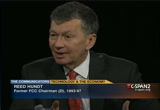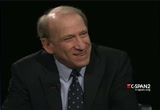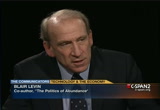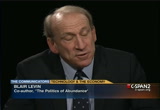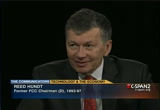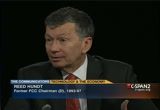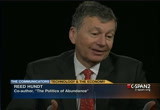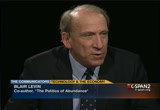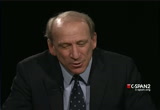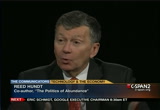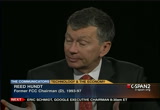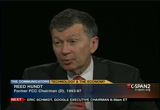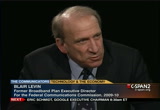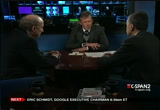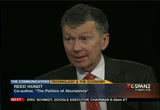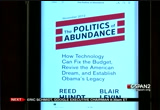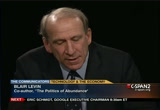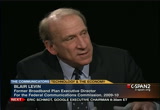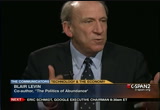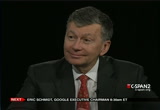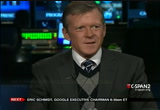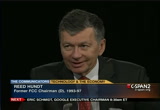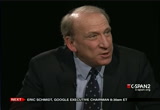tv The Communicators CSPAN January 14, 2013 8:00am-8:30am EST
8:00 am
>> you've been watching booktv, 48 hours of book programming beginning saturday morning at 8 eastern through monday morning at 8 eastern. nonfiction books all weekend, every weekend right here on c-span2. >> here's a look at what's ahead today. coming up next, "the communicators" with former fcc chairman reed hunt and the former architect of the ncc's national broadband plan who discuss their book on the future of technology. then google chairman eric schmidt talks about his company's new innovations and the impact on technology on society. after that, we'll be live at johns hopkins university with the start of an all-day summit on reducing gun violence in the u.s. >> host: well, there's a new e-book on the market, and it's called "the politics of abundance. how technology can fix the budget, revive the american dream and establish obama's legacy." the co-authors are both former fcc officials. reed hundt is the former chairman of the fcc in the
8:01 am
clinton administration, and blair levin spent many years there, most recently as part of their national broadband plan, the executive director. gentlemen, thanks for being on "the communicators." mr. hundt, your book's subtitle, how can technology fix the budget and help us over the so so-of called fiscal cliff? >> guest: well, it is a the subtitle. it's a bit of a mouthful, but the fundamental idea here is if you spend time in silicon valley, if you spend time in detroit where the automobile industry is being rebuilt, if you spend time outside the beltway, you feel that america has the potential to generate abundance for it own citizens and for the world. if you spend time only inside the beltway, it looks like a zero sum game, it looks like lose/lose, and who's going to lose the most is the gist of the negotiation. so what we tried to say in this book is or what are the lessons of the technology sector, what
8:02 am
are the lessons that come from the optimism in the technology sector and how can they give us some ideas that we could pass into law here in the united states, here in washington, d.c.? >> host: blair levin, you talk two different platforms in your book, "the politics abundance." what are those platforms? >> guest: the basic idea is how do we drive abundance by looking at the areas that absorb a lot of private cap tag -- capital, and they can drive productivity not just in those sector, but throughout the entire economy. and the two we're really focused on are what we call the power platform, the energy grid needs to be redone, and the knowledge platform. we don't -- we need to do some work on the networks of what we call knowledge, which is to say broadband, but it's really about how do we apply it, how do we deliver bandwidth that can really change education, change health care, change all government services so we get faster, cheaper, better? the same kind of phenomenon that
8:03 am
we see on our phones and our or networks we want to see if public goods and services like education and health care. >> host: well, as a former executive director of the national broadband plan, mr. levin, how important is speed when it comes to improving our economy, in your view? >> guest: well, it depends on a variety of different uses. for example, in medicine we're now moving to a place where we can have wire lessen sores really improve medicine, and that's great. but if we want to do degnomic medicine, we need a much faster network. bill clinton, the former president, was saying we can't really expect our businesses to compete internationally if they only have access to speeds a fourth the speed of korea, and he's absolutely right. >> host: reed hundt, energy is included in your book on testimonying. technology. why? >> guest: to quote the smashing
8:04 am
pumpkins, we all know that we need a clean energy economy where it's really, really cheap to buy the energy and where the energy that you're buying is not polluting the atmosphere. it is not causing greenhouse gases that are driving up the temperature and producing droughts. it is not producing a number of other health-related effects from from air pollution. we all know this. we know what we're after. how are we going to get there? the way we discovered in the book is it's pretty simple. could you have the federal government buy all the new things that are necessary and then give them away? it's not practical, it's not going to happen. we don't have that capability in the federal government to add to the deficit. so you have to open the door to private investment to do this job of rebuilding the power platform in the united states. >> host: and the technology aspect of that is -- >> guest: the technology aspect is manifold. in the last four years alone, the solar industry has gotten on what they call a moore's law
8:05 am
curve meaning price performance improves by roughly two times every 18-24 months. in the last four years, we've gotten ourselves in an innovation cycle in batteries so that by the end of 2020 electric vehicles actually will be price competitive with gas-driven cars. the problem with these things is that we can't wait. we can't wait because of the environmental effects, and we can't wait because we need the economy to grow quickly right now. so the book lays out a whole bunch of different ideas for bringing private investment much, much more quickly into the job of rebuilding the power plant. >> host: reed hundt, recently on this policeman james glans was on this program. he's written a series on some of the new york power plants, and he doesn't necessarily agree that the internet is completely green or is terribly green. what's your thought on that? >> guest: well, he's right about that. people say the data centers in
8:06 am
the united states account for 2% of all electricity consumption. if it isn't exactly that number, it certainly is the biggest single new, additional element of demand in the whole electricity area. and where do they put data centers? people are talking about putting them in finland or canada or on the shores of major rivers because they want the atmosphere to be really cold, and they want the electricity to be really, really cheap. they're trying to deal with the engineering demands of data centers. those are stopgap solutions. in the long run, what we need is a clean energy platform that includes, as the president often says, all of the above; lots more natural gas, lots and lots more solar, more wind, better transmission systems. but here's the beauty part of it, it all will require a trillion dollars of private investment. and because of technological breakthroughs and new financing ideas, the electricity at the other end of the change will actually be lower priced than
8:07 am
electricity today. >> guest: if i could just add, when we started the national background plan, we started with the -- broadband plan, we started with the question what are some key problems that could be potholes in the information highway, what are some things we should worry about. and one of the interesting things i didn't anticipate was the number of companies that really wanted to deliver great connectivity and great applications, they're very worried about this problem, about the amount of power it takes to run these data centers. turned out, that was beyond the scope of the broadband plan which was pretty broad, but it's absolutely a concern of everybody. so we need to do something, things like what reed has been working on over the years to enable it. but the other point is it is green to deliver goods and services using bandwidth and chips instead of atoms. and so there's a lot of things if the economy where we know this is where the economy is going. we want to do it faster, but we also want to do it in a sustainable way, and the united
8:08 am
states should want to lead in how we do that. >> host: mr. levin, in "the politics of abundance," there's civil instances where you say the president could act on his own without congressional approval. what are some of those instances? >> guest: we lay out, for example, in the area of education we -- i think the secretary of education, arne duncan, has done a great job laying the foundation, and now it's just a question of how do we accelerate it. and the things where the president, working with the department of education, could, for example, create a data exchange system which allows us to both digitize and personalize education. very similar kind of thing in health care. and so there are all kinds of different things that the president using executive authority as, in fact, they have laid the foundation for already, could act to really accelerate that movement toward the digital platform. >> host: where does congress come in? >> guest: well, congress comes
8:09 am
in in a number of places, and we lay out at the end of the book four trades we really think congress should take part in. i'll mention one that's very related to the broadband area. um, there was a high-tech ceo council that suggested that there's a trillion dollars of savings if the government moves all of its goods and services to the digital platform. what we propose is a base closing-like commission where you get those ceos in the room, you make them look at it, those problems, and have very specific solutions and then, basically, give congress an up or down vote on what to do. there's -- in order to do that, you have to be able to use some of the savings in the outyears up front to buy new equipment which is more efficient and things like that. i also think we need to make sure that everyone in the country is online. in other words, if we're going to move all of government services to the digital platform which we really want to do, we can't leave anybody behind. so that would be one where i
8:10 am
think congressional authority is necessary, but there's some others that maybe reed -- >> guest: well, here's some other examples. let's take corporate tax. it seems likely that there'll be a yearlong debate about corporate taxation here in washington in the year 2013. most businesses are global in some respect now. not all, but most big businesses for sure. if you're a big business and you look over to china, you'll see in their five-year plans in energy or in information technology specific promises to have a 15% corporate income tax rate. you come to the united states, you have no predictability, you don't know what it is, and the current rate is much, much higher than that. we need reforms that say to businesses we want you to invest here in the united states. while we're having this big debate about corporate tax reform, let's include in it specific reforms for the energy sector that, in fact be, are designed to attract a massive amount of new investment to
8:11 am
build a clean energy platform. let's have that be a subpart of the corporate tax reform debate. another example, the carbon tax. the carbon tax is a prod-based -- broad-based tax that does not, in fact, have to have a big impact on consumers. it could be placed on electric utilities, it could be something they avoid by moving to clean energy so that they wouldn't have to pay it. but if we had that carbon tax, it would, for a while, help close the deficit, and it would be a stimulus to the utilities to move to clean energy. so that's the second idea. and the third, many states now are following the lead of connecticut which is the first state to have created the state green bank, an institution that couples with the private sector and finances distributed solar or wind or electric utility grilled rebuilds or energy efficiency measures fending on the state. -- depending on the state. let's have the federal government loan money to state green banks at the extraordinarily low rate the federal government current libor
8:12 am
rowing at. so these are a handful of different ways to provide a financing support and a tax policy support for massive private invest bement. >> host: reeled hundt, to achieve some of the goals in "the politics of abundance," what's the role of the fcc? >> guest: well, the fcc can take the lead on a handful of topics, and on other topics it should provide policy ideas that congress and the executive branch will need to work out together. an example of what the fcc can do is it can reform the e-rate, the program we were involved with back in the '90s, so that the things that school districts and libraries buy under the e-rate are closer in description to modern technology and are really not just the old things that aren't as efficient as the modern technologies permit. >> host: blair levin n your book you spend quite a bit of time comparing today to the
8:13 am
clinton/gore era. and what occurred in the '90s, what worked. what worked. >> guest: well, what worked was that there was this massive private investment starting really in the middle of the decade that to a surprising degree drove surpluses in the federal government budget. and as george will recently pointed out, it was really the internet that drove that wonderful period where we weren't arguing about falling off a fiscal cliff. rather, we were arguing about do what do we do with the surplus. and i think that lesson is a lesson you can actually see at various other points in history. wherever you have economic growth, it's often due to the fact that there's, essentially, a technological change going on. so we had railroads, we had steel, we had cars. what was great about the '90s was, yo u.n. -- you know, in part because of some of policies we adopted, but really there was a wonderful consensus in the
8:14 am
federal government about the deregulation of the telecommunication cans sector that i think worked extremely well. there was an understanding that this is a sector that can help drive growth. and what we've tried to say were what were the lessons of that time, and it's how do we get rid of the rules that may have made sense 20, 30 years ago, but don't make sense now. also how do we deliver public goods and services better for all americans, and that's what really -- asking that question of each other was what led us to want to write this book. >> host: well, blair levin, begin what you just said, what's your take on what the itu is doing right now? >> guest: um -- >> host: when it comes to the worldwide internet? >> guest: well, the itu just finished up their work. i can't say i've had an opportunity to either examine it in detail from the written product or have a chance to talk with a lot of friends who were over there to do it. i certainly like a lot of other americans am very worried about
8:15 am
countries that believe that what we need to do is regulate the internet more or have countries simply suppressing both the expressions of speech as well as the economics of what the internet can be. there's certain countries that want to protect certain industries and have ideas in mind to do that, so i would put myself as kind of nervous about that. i think we ought to be moving in the direction which, you know, is more about opennesses and economic and the free expression of ideas. >> host: reed hundt, when it comes to the internet and the politics of abundance, your book, there is a real role for government, is that fair to saysome. >> guest: oh, absolutely. let's talk about the power grid for just a second. there's one thing that we don't know how to change. you can have a wireless industry in communications, but when you talk about wireless and electricity, that is called lightning. it is dangerous, it is not a consumer product. you have to recognize in the electric grid that there's a
8:16 am
local distribution network, those lines that go up and down the street and reach your house, and they need to be owned by a company x that company needs to invest to keep the trees from falling on these lines and to repair them and to deal with health and safety issues. and so we have to have that be the pivot point and not say, oh, well, that just isn't important anymore, right? but around that you can move to a clean energy platform. there are more than 100 million buildingsing in the united states on -- buildings in the united states. on average we ought to be having about $10,000 of investment for every one of the 100 million buildings on average to have it be that they consume less electricity and get the same heating and lighting and air-conditioning. there are about six million businesses in the united states. many of them, millions of them ought to be able to have solar power on their roofs to provide their own electricity because many of them have flat roof
8:17 am
buildings, warehouses, buildings if a strip mall, grocery stores. they all should have solar power on their of roofs. even in cold gray states in the far north, solar power can provide up to 15% of the electricity with appropriate financing at prices that are at or below the levels that exist today. so these changes around the electric grid are really easily possible if we just change the regulatory policies, if we change the financing policies. we don't have to have a massive overhaul. we don't have to have a nationalization of businesses. we just have to open the door by some regulatory measures and some deregulatory measures to what we can reasonably estimate to be a trillion dollars of private invest bement. >> host: what would you -- go ahead. >> guest: i was just going to say, if you look back in history, there's always a role for government when you see this kind of growth that we're looking for. exactly 150 years ago the
8:18 am
congress passed three laws which i think if you consider how america became a leader in the world economy, it really goes back to those three laws; the transcontinental railroad act, the morrow act which created the public universities and the homestead act. we took assets which were underutilized in terms of land, in terms of human capital, and we said we're going to find a way to utilize them. and that's the kind of inspiration we're talking about now. how do we leverage what we have now to have another generation of american economic leadership? >> host: blair levin, how you ubiquitous is brand in the u.s. right now? >> guest: what we found in the national broadband plan by a current definition -- it's always a moving target -- there's about seven million homes which represent about 5% of the american homes that don't have access to it. we can actually solve about 80% of that problem relatively easily with kind of -- there were some changes, the fcc
8:19 am
should be congratulated. about a year ago they made some changes which i think are going to accelerate that. but that momentum solve a couple of problems -- that doesn't solve a couple of problems; how do we have economic leadership, how do we have the next generation of networks and applications? we can't, we can't sit on our laurels, in other words. so how do we have a constantly-improving ecosystem, and there are a variety of ideas in the book about that. i also think that in the long run those speeds aren't going to be fast enough for rural, so we're going to have to find -- one of the things we propose in the book is a kind of race to the top for technologies that will use the asset that rural has which is spectrum. there's a lot of extra spectrum in rural america to try to get to the speeds that are more similar to what urban folks benefit from. >> host: reed hundt, you were the fcc commissioner who oversaw the first spectrum auction, is that correct? >> guest: it's true. >> host: some spectrum auctions are coming up. do they need to be more focused, in your view?
8:20 am
>> guest: no, i don't think so. i have no to anytime that my -- admit that my friends are running these auctions, and i think they're already doing a great job. no, i think that they don't need to be more focused. the idea of this auction, blair put in the national broadband plan. it has drawn bipartisan support. you do have to be a game theorist as opposed to a mere lawyer to understand the intricacies. but really the main thing is this is an example of how it's not that difficult to have really big, profound change once you really focus on it. what's the big change here? there are an awful lot of over the-the air broadcast signals that really are reaching almost no one from stations that have almost no audience and would be just as happy to be on cable tv. that spectrum should be used for smartphones. the change from the one to the other is tricky, to be fair to everybody involved, it's tricky,
8:21 am
you have to strike a balance. but the change conceptually is pretty simple, and when it happens, you will see -- this is in blair's plan -- you will see tens and tens of millions of dollars in private sector created. that's the cool thing, right? because the technology created the potential. folks in government, they have to figure out how to open that door which sometimes you do need a big key, and you need to figure out some tough combinations of the locks. but if you can just make those changes, then the investment will just pour into the new opportunity. >> host: we are talking with former fcc chairman reed hundt and former national broadband plan executive director blair levin about their book, "the politics of abundance: how technology can fix the budget, revive the american dream and establish obama's legacy." one of the examples you put in your book is what's happening right now in kansas city with google. are you supportive of that
8:22 am
project? how does that project play into the politics of abundance? >> guest: so i don't work at google, let me give you my interpretation of it. they read blair's broadband plan that said why can't we have a 10x or 100x improvement in broadband, and then they said, well, let's just see if we can't demonstrate that in kansas city. i think it's tremendous when a business empowers people in its own shop to have that kind of initiative. but as blair will tell you, it is resonating in other cities and states as well, and they are following their own methods to get to very similar results. >> guest: that's right. last week i was in seattle with the mayor at the university of washington announcing a gigabit deployment that i think will be -- it's not as large as the google deployment in kansas city, but is similar in terms of scope. chattanooga has a gigabit deployment. the mayor of chicago, rahm emanuel, recently put out a
8:23 am
request for information saying the city wanted to deploy gigabit so we can be a leader or in bandwidth-delivered innovation and got a number of responses. a group i work with is working with a number of university communities to do that same thing, and we're talking to lots of different mayors who recognize broadband's not just an intertapement tool, it's really an economic development tool. and we're going to have to have bigger quantities, we're going to have to have faster, cheaper, better broadband if we want to be at the forefront of the next generation of innovation. >> host: well, you said you were in seattle, mr. levin, what do you do today? >> guest: i'm sorry -- >> host: what's your job? >> guest: that's a good question. i'm at the aspen institute, but most of my time is with this gig.u project. also when we noticed -- google did a great thing for this country, i think, you know, when they said we'd like to try this, and then 1100 communities applied. well, that doesn't mean that all the citizens want to sign up for
8:24 am
a gigabit, but it does mean that 1100 communities recognize this is the future. we want to lead in that future. we want to have the great innovators come to our commitments. so our thought was -- communities. so our thought was, you know, one company, one city is not enough. we need a critical mass, maybe 10, maybe 20, and which were the communities most likely to embrace this generation, and we thought university towns were a good place to start, so that's what i spend most of my time doing. >> host: is the project that google is doing in kansas city, is it economically feasible to do that nationwide? >> guest: i'm not sure it's economically feasible nationwide, but i think there are a number of places where it is economically feasible, and part of what they've done very well -- and you've also got to give the city a lot of credit for this as well as the state government, the county government -- is they've looked at it as a problem of how can we utilize existing assets to lower the cost of deployment? pretty much all the gig.u comunts, we have a project in maine, in florida as well as already one in chicago.
8:25 am
and it's really about can we utilize pre-existing assets better to bring more bandwidth at a lower price. and so i think that's kind of, in the short term, the idea to really get it going. >> host: reed hundt, what is it that you are doing these days? >> guest: i'm on the board of a bunch of tech companies out in silicon valley. i run a nonprofit in washington called the coalition for green capital which designs state green banks for states that want to do it. and then in the holidays i'm in charge of thinking of events that are adequate to bring the children home to see their mom and dad. [laughter] >> guest: and you're doing a great job of that. [laughter] >> host: i read in your biography, i read somewhere that you were the first fcc commissioner to actually have a computer on his or her desk. >> guest: well, that's true. i'm the first of to have paid a cell phone call to alaska. i'm the first to have engaged in a lot of these things that are so familiar now that most people
8:26 am
can't believe that the world ever didn't run this particular or way. but what blair and i, when we think about the '90s, what we're really proud of is, oh, in the 1990s everyone on every rung of the income ladder in the united states, they did better. all the income quintile, everyone had income growth. the unemployment rate was at a record low, and the best thing was that young people were filled with a sense of opportunity. and if we could just have that be recreated, that everyone under the age of 30 would feel this is a glorious world, and i can make an impact, and i can be the here eau of -- hero of my own life, if we could get that, then america's future will be boundless. >> host: when you look ten years down the road, what do do you se in the tech world, in the telecom world? >> guest: i am a huge opt mist. ten years down the road, i think we will have a substantially clean energy platform in the
8:27 am
united states, that electricity will be cheaper, not more expensive, that we will ten years down the road have seen about 500-$600 billion of new private investment that has been, that has created a million to two million new jobs. i see inventions in batteries and in solar power and in the design of wind turbines and in the transmission technologies that are, they're actually right there being proved in the labs, but they're not visible in the commercial world, but they will be ten years down the road or fasterrer. the only thing i see that is a caution of great size is this: we can't be patient about this. climate change is real enough, dangerous enough that we can't wait for the tenth year for these things. we have to be starting them all tomorrow. >> host: blair levin, very quickly, same question and then tell us where "the politics of
8:28 am
abundance is available." >> guest: what i see in ten years is that every child has an opportunity to have a much better education, because it'll be personalized, it'll be digital. their parents will be able to -- will help them more. the teachers will have tools of situational awareness that will allow them to be better teachers. same thing for medicine, personalized, digital medicine. doctors will have greater ability to understand what's going on with the patients, the patients will have better control over their own lives. as reed and i age, we'll with able to stay -- we'll be able to stay in our homes longer. i must say i also think driverless cars will be great as we get older. america never fails when it folks, but we need to focus, and we need to focus now. the book is available on amazon, it's an e-book as well as some other sites that people go to. and we certainly hope people buy it and read it. the most important thing is to
8:29 am
get these ideas and ideas about how we grow, how we create a great future for the next generation into the policy debate right now. >> host: blair levin, reed hundt, "the politics of abundance: how technology can fix the budget, revive the american dream and establish obama's legacy." this is "the communicators" on c-span. >> coming up next, google chairman eric schmidt speaks at the world in 2013 festival in new york city about his company's new innovations and the impact of technology on society. after that we'll be life from johns hopkins university hosting an all-day summit with public health scholars on options for reducing gun violence in the weich of the newtown -- wake of the newtown, connecticut, school shootings. today the house rules committee will consider amendments to the hurricane sandy disaster relief bill. toward the end of the last congress, the senate passed a bill providing $60
118 Views
IN COLLECTIONS
CSPAN2 Television Archive
Television Archive  Television Archive News Search Service
Television Archive News Search Service 
Uploaded by TV Archive on

 Live Music Archive
Live Music Archive Librivox Free Audio
Librivox Free Audio Metropolitan Museum
Metropolitan Museum Cleveland Museum of Art
Cleveland Museum of Art Internet Arcade
Internet Arcade Console Living Room
Console Living Room Open Library
Open Library American Libraries
American Libraries TV News
TV News Understanding 9/11
Understanding 9/11
